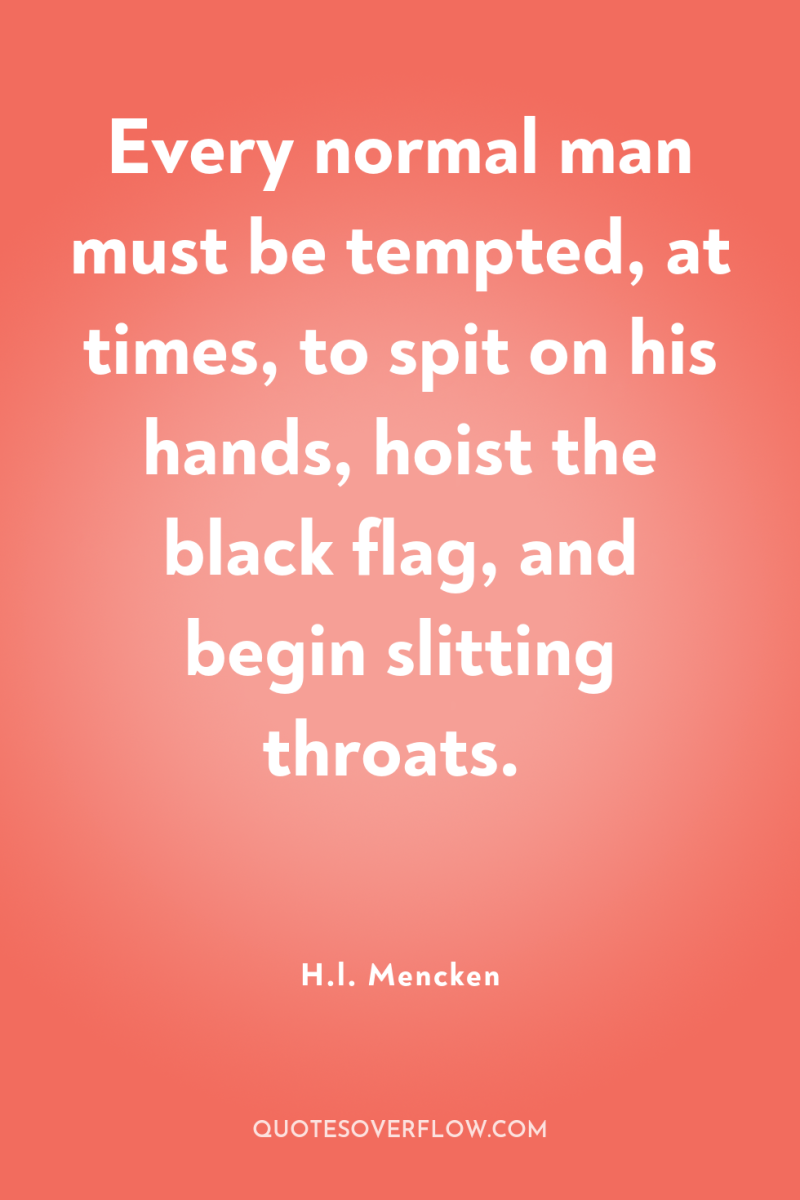
1
Every normal man must be tempted, at times, to spit on his hands, hoist the black flag, and begin slitting throats.H.l. Mencken

2
Happiness is the china shop love is the bull.H.l. Mencken

3
You can't do anything about the length of your life, but you can do something about its width and depth.H.l. Mencken
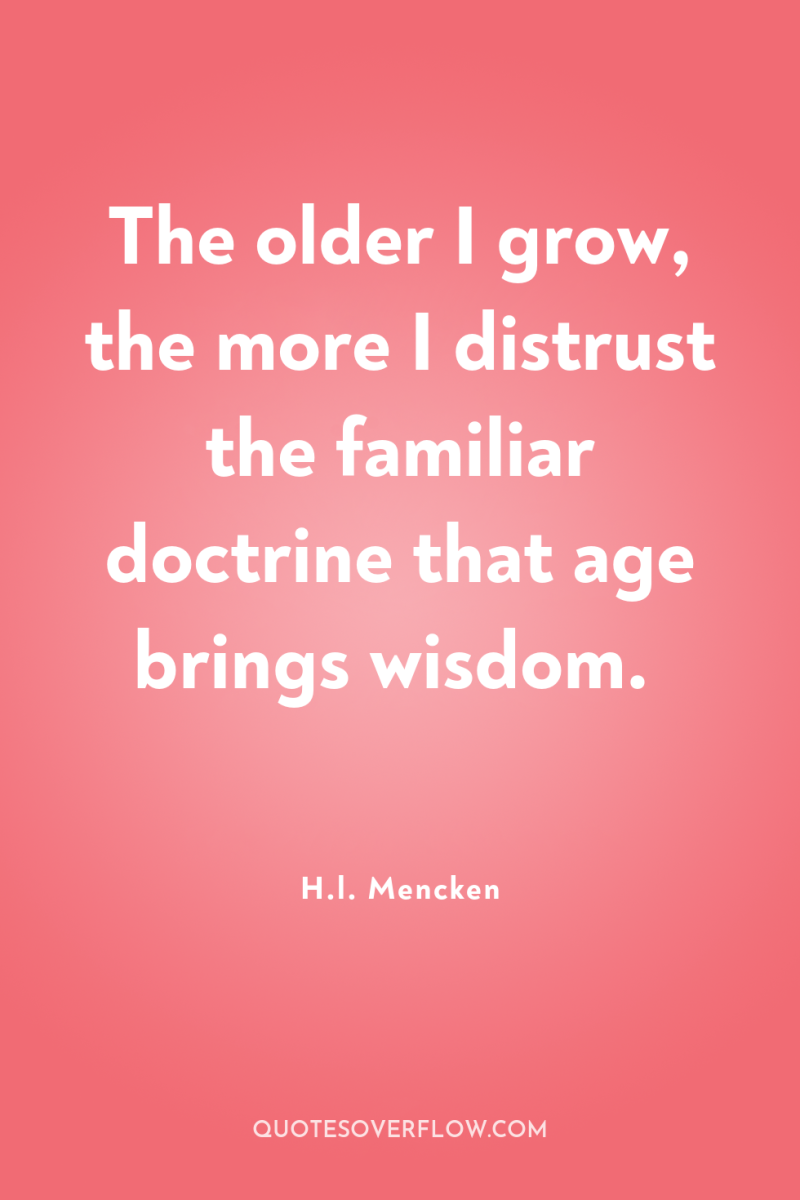
4
The older I grow, the more I distrust the familiar doctrine that age brings wisdom.H.l. Mencken

5
An idealist is one who, on noticing that a rose smells better than a cabbage, concludes that it makes a better soup.H.l. Mencken
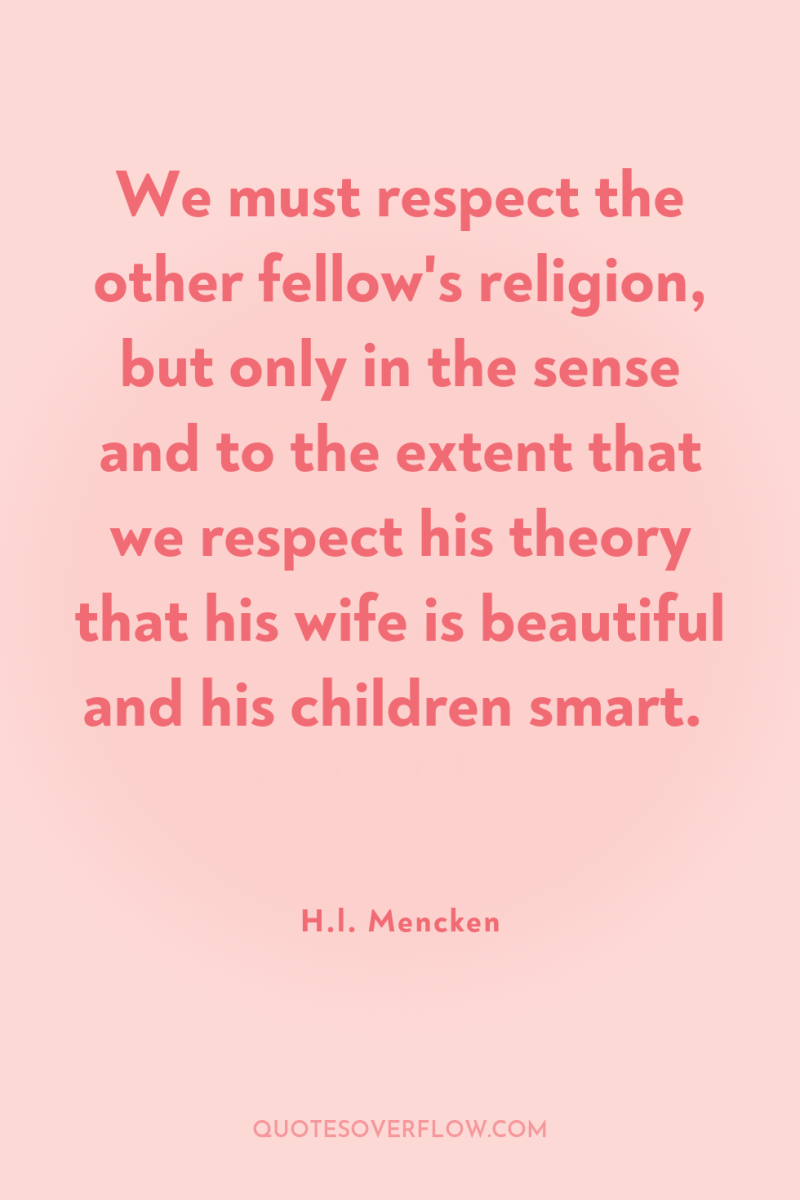
8
We must respect the other fellow's religion, but only in the sense and to the extent that we respect his theory that his wife is beautiful and his children smart.H.l. Mencken
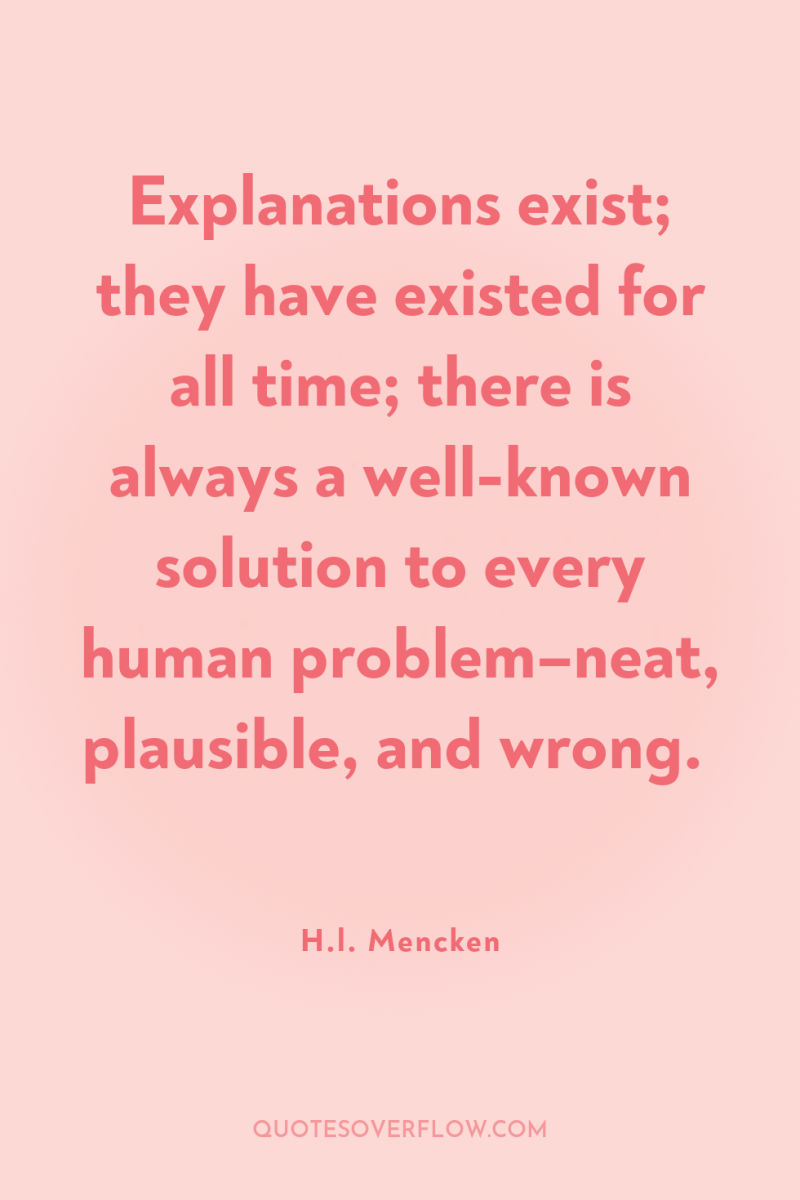
9
Explanations exist; they have existed for all time; there is always a well-known solution to every human problem–neat, plausible, and wrong.H.l. Mencken

10
Truth would quickly cease to be stranger than fiction, once we got as used to it.H.l. Mencken
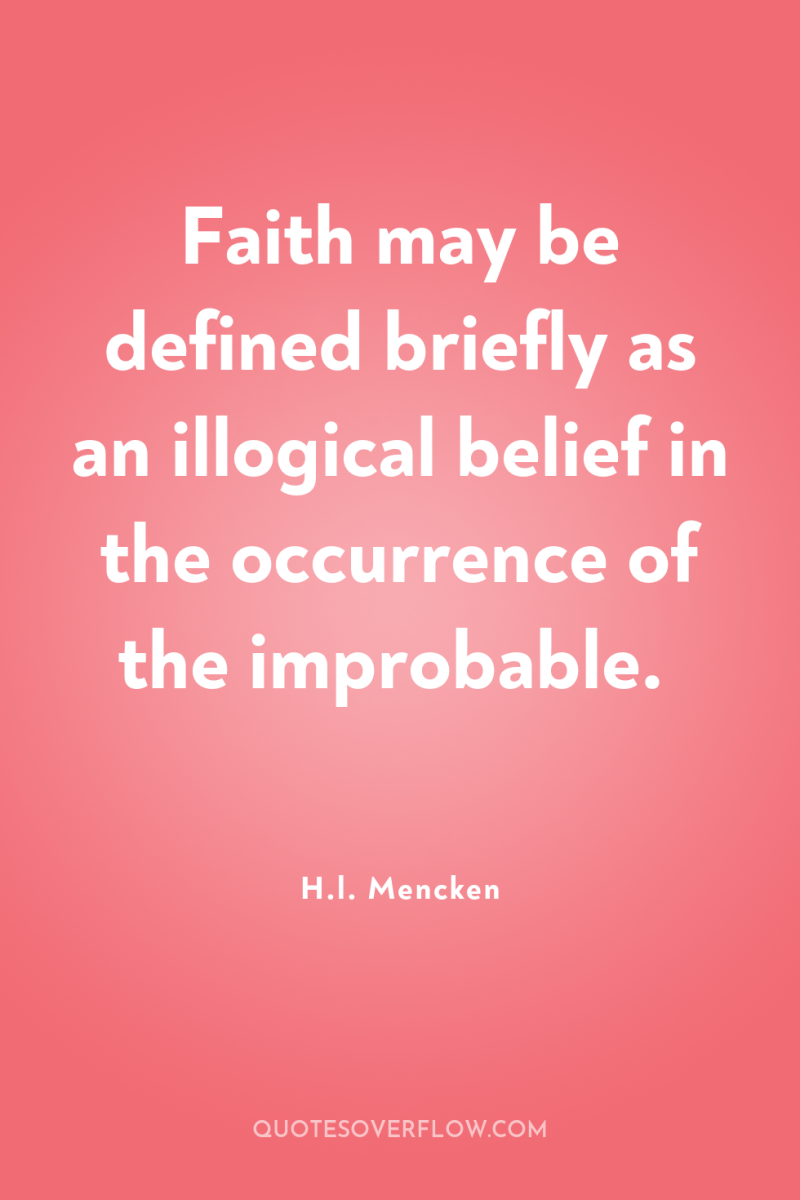
11
Faith may be defined briefly as an illogical belief in the occurrence of the improbable.H.l. Mencken
12
It is often argued that religion is valuable because it makes men good, but even if this were true it would not be a proof that religion is true. That would be an extension of pragmatism beyond endurance. Santa Claus makes children good in precisely the same way, and yet no one would argue seriously that the fact proves his existence. The defense of religion is full of such logical imbecilities. The theologians, taking one with another, are adept logicians, but every now and then they have to resort to sophistries so obvious that their whole case takes on an air of the ridiculous. Even the most logical religion starts out with patently false assumptions. It is often argued in support of this or that one that men are so devoted to it that they are willing to die for it. That, of course, is as silly as the Santa Claus proof. Other men are just as devoted to manifestly false religions, and just as willing to die for them. Every theologian spends a large part of his time and energy trying to prove that religions for which multitudes of honest men have fought and died are false, wicked, and against God. .H.l. Mencken

13
A philosopher is a blind man in a dark room looking for a black cat that isn't there. A theologian is the man who finds it.H.l. Mencken
14
It is the natural tendency of the ignorant to believe what is not true. In order to overcome that tendency it is not sufficient to exhibit the true; it is also necessary to expose and denounce the false. To admit that the false has any standing in court, that it ought to be handled gently because millions of morons cherish it and thousands of quacks make their livings propagating it–to admit this, as the more fatuous of the reconcilers of science and religion inevitably do, is to abandon a just cause to its enemies, cravenly and without excuse.H.l. Mencken
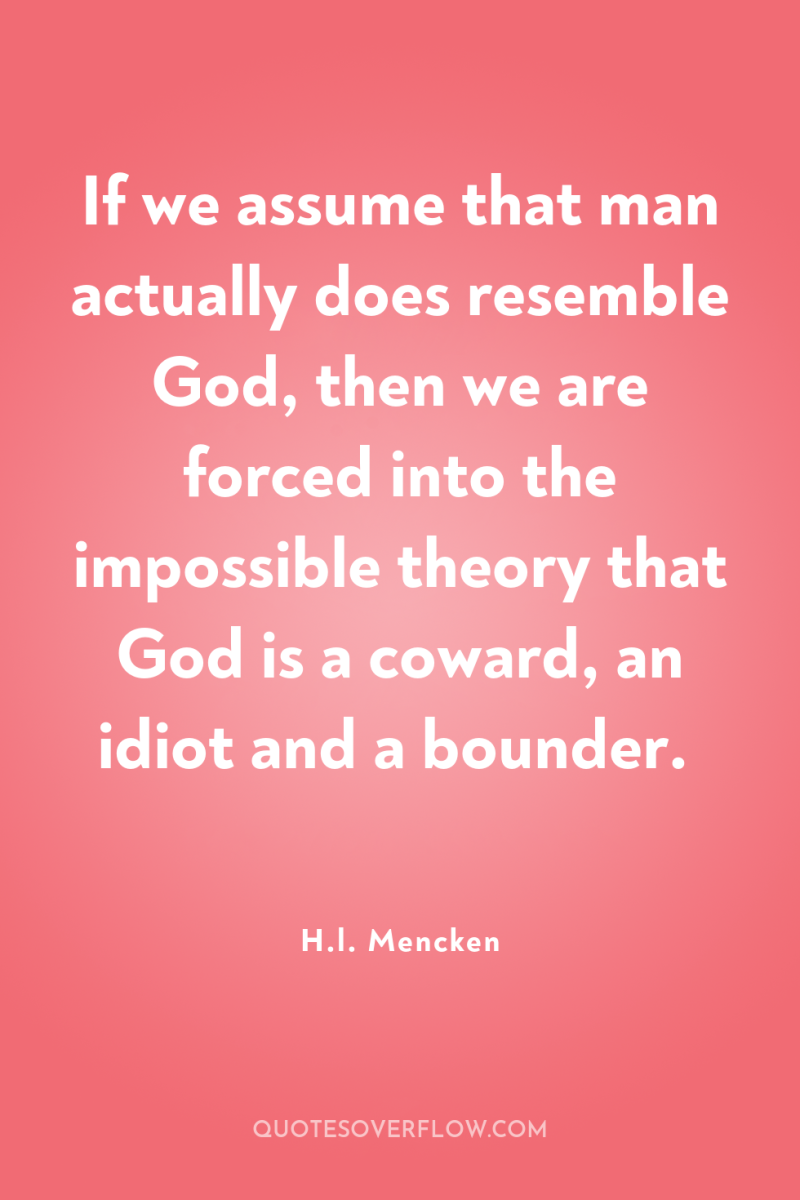
15
If we assume that man actually does resemble God, then we are forced into the impossible theory that God is a coward, an idiot and a bounder.H.l. Mencken
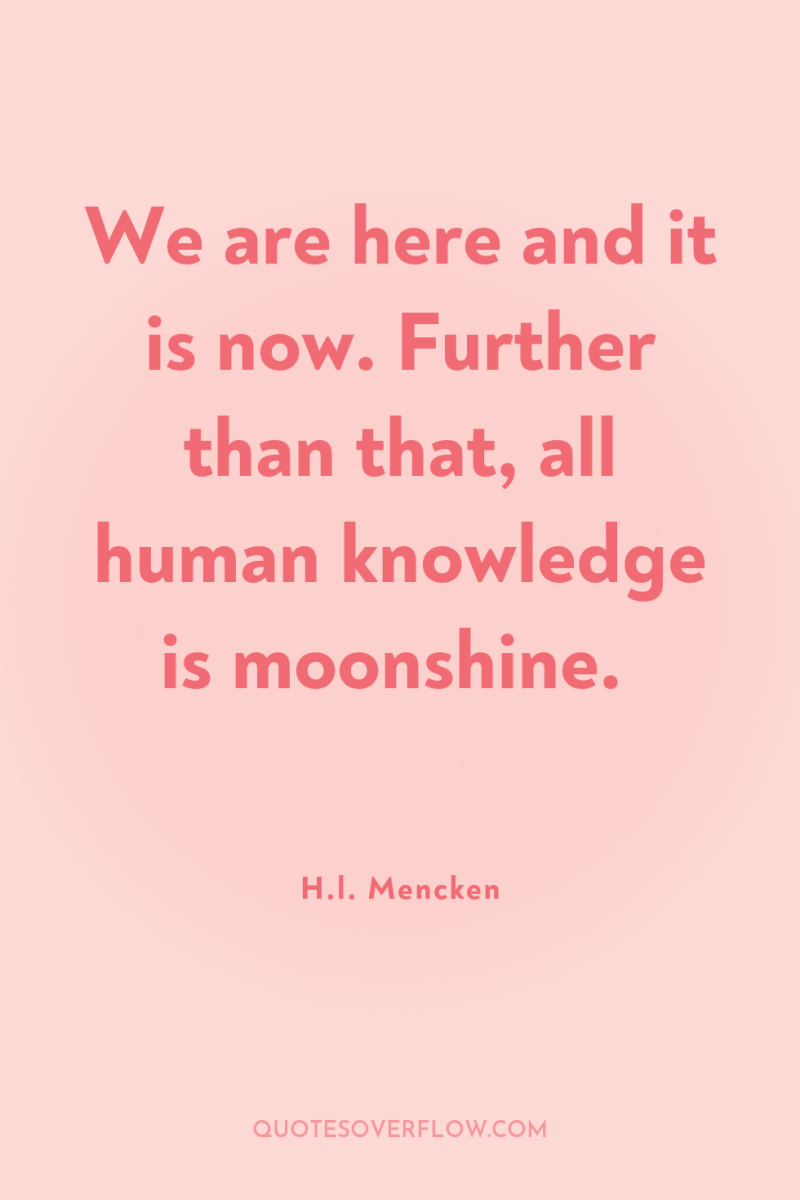
16
We are here and it is now. Further than that, all human knowledge is moonshine.H.l. Mencken

17
Puritanism: The haunting fear that someone, somewhere, may be happy.H.l. Mencken

18
No matter how happily a woman may be married, it always pleases her to discover that there is a nice man who wishes that she were not.H.l. Mencken

19
If, after I depart this vale, you ever remember me and have thought to please my ghost, forgive some sinner and wink your eye at some homely girl.H.l. Mencken

20
You never push a noun against a verb without trying to blow up something.H.l. Mencken

21
There is in writing the constant joy of sudden discovery, of happy accident.H.l. Mencken
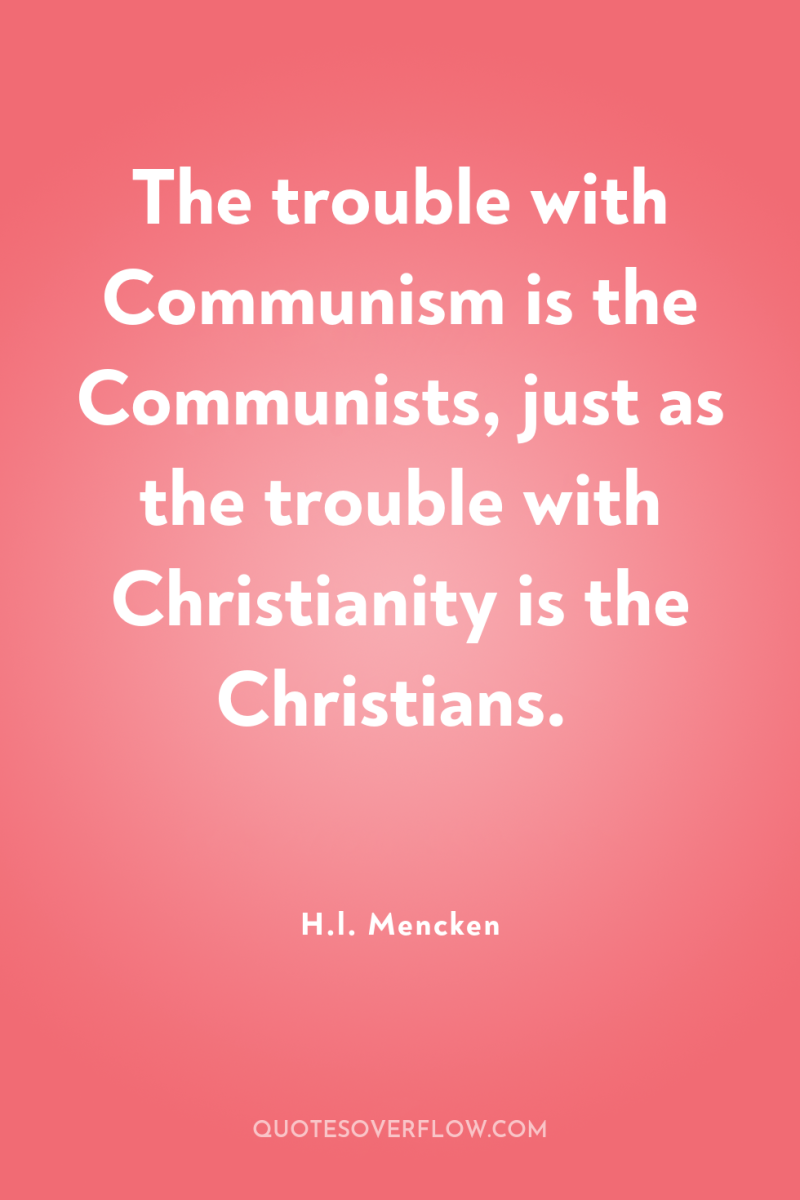
22
The trouble with Communism is the Communists, just as the trouble with Christianity is the Christians.H.l. Mencken
23
One of the most irrational of all the conventions of modern society is the one to the effect that religious opinions should be respected. …[This] convention protects them, and so they proceed with their blather unwhipped and almost unmolested, to the great damage of common sense and common decency. that they should have this immunity is an outrage. There is nothing in religious ideas, as a class, to lift them above other ideas. On the contrary, they are always dubious and often quite silly. Nor is there any visible intellectual dignity in theologians. Few of them know anything that is worth knowing, and not many of them are even honest. .H.l. Mencken
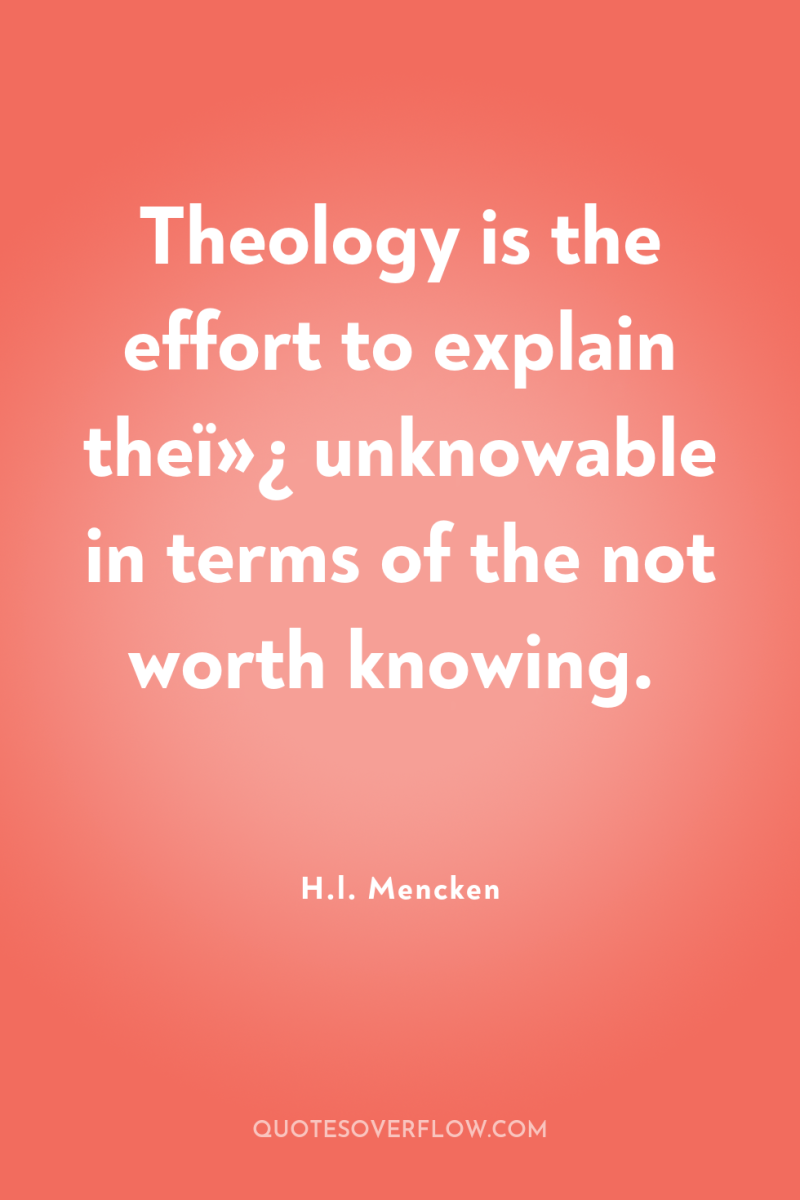
24
Theology is the effort to explain the unknowable in terms of the not worth knowing.H.l. Mencken
25
The plain fact is that education is itself a form of propaganda - a deliberate scheme to outfit the pupil, not with the capacity to weigh ideas, but with a simple appetite for gulping ideas ready-made. The aim is to make 'good' citizens, which is to say, docile and uninquisitive citizens.H.l. Mencken
26
The most erroneous assumption is to the effect that the aim of public education is to fill the young of the species with knowledge and awaken their intelligence, and so make them fit to discharge the duties of citizenship in an enlightened and independent manner. Nothing could be further from the truth. The aim of public education is not to spread enlightenment at all; it is simply to reduce as many individuals as possible to the same safe level, to breed and train a standardized citizenry, to put down dissent and originality. That is its aim in the United States, whatever the pretensions of politicians, pedagogues and other such mountebanks, and that is its aim everywhere else. .H.l. Mencken
27
A judge is a law student who marks his own examination papers.H.l. Mencken
28
The value the world sets upon motives is often grossly unjust and inaccurate. Consider, for example, two of them: mere insatiable curiosity and the desire to do good. The latter is put high above the former, and yet it is the former that moves one of the most useful men the human race has yet produced: the scientific investigator. What actually urges him on is not some brummagem idea of Service, but a boundless, almost pathological thirst to penetrate the unknown, to uncover the secret, to find out what has not been found out before. His prototype is not the liberator releasing slaves, the good Samaritan lifting up the fallen, but a dog sniffing tremendously at an infinite series of rat-holes.H.l. Mencken
29
Before one may scare the plain people one must first have a firm understanding of the bugaboos that most facilely alarm them. One must study the schemes that have served to do it in the past, and one must study very carefully the technic of the chief current professionals.H.l. Mencken
30
Off goes the head of the king, and tyranny gives way to freedom. The change seems abysmal. Then, bit by bit, the face of freedom hardens, and by and by it is the old face of tyranny. Then another cycle, and another. But under the play of all these opposites there is something fundamental and permanent – the basic delusion that men may be governed and yet be free.H.l. Mencken
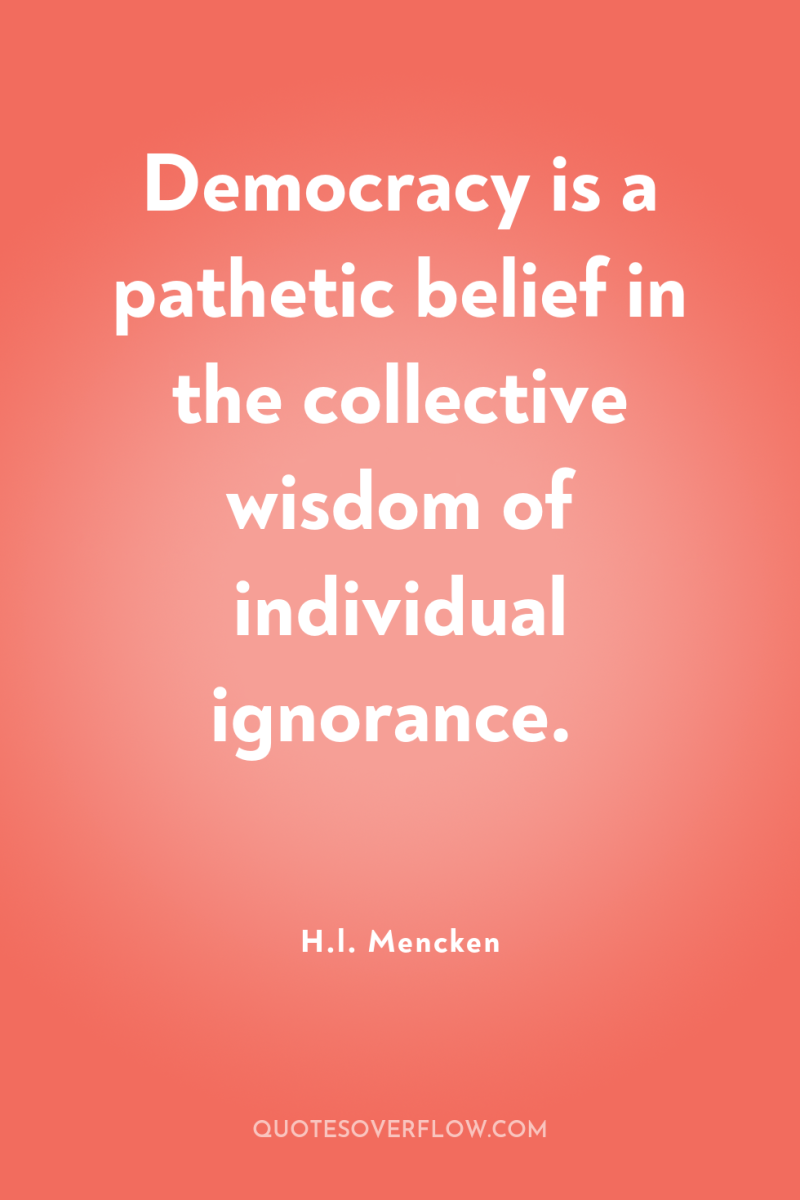
31
Democracy is a pathetic belief in the collective wisdom of individual ignorance.H.l. Mencken
32
As democracy is perfected, the office of president represents, more and more closely, the inner soul of the people. On some great and glorious day the plain folks of the land will reach their heart's desire at last and the White House will be adorned by a downright moron.H.l. Mencken

33
A good politician is quite as unthinkable as an honest burglar.H.l. Mencken
34
Civilization, in fact, grows more maudlin and hysterical; especially under democracy it tends to degenerate into a mere combat of crazes; the whole aim of practical politics is to keep the populace alarmed (and hence clamorous to be led to safety) by an endless series of hobgoblins, most of them imaginary. Wars are no longer waged by the will of superior men, capable of judging dispassionately and intelligently the causes behind them and the effects flowing out of them. The are now begun by first throwing a mob into a panic; they are ended only when it has spent its ferine fury.H.l. Mencken
35
All government, in its essence, is a conspiracy against the superior man: its one permanent object is to oppress him and cripple him. If it be aristocratic in organization, then it seeks to protect the man who is superior only in law against the man who is superior in fact; if it be democratic, then it seeks to protect the man who is inferior in every way against both. One of its primary functions is to regiment men by force, to make them as much alike as possible and as dependent upon one another as possible, to search out and combat originality among them. All it can see in an original idea is potential change, and hence an invasion of its prerogatives. The most dangerous man to any government is the man who is able to think things out for himself, without regard to the prevailing superstitions and taboos. Almost inevitably he comes to the conclusion that the government he lives under is dishonest, insane and intolerable, and so, if he is romantic, he tries to change it. And even if he is not romantic personally he is very apt to spread discontent among those who are. .H.l. Mencken

36
Every election is a sort of advance auction sale of stolen goods.H.l. Mencken
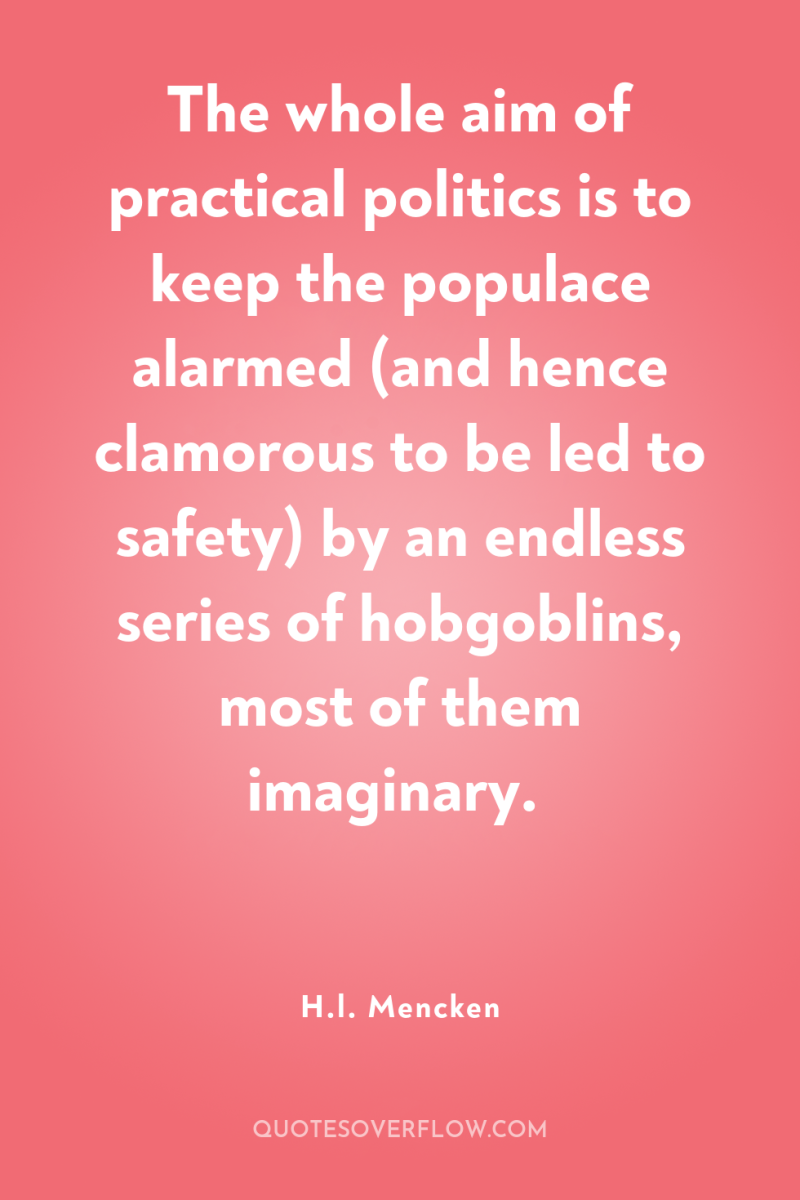
37
The whole aim of practical politics is to keep the populace alarmed (and hence clamorous to be led to safety) by an endless series of hobgoblins, most of them imaginary.H.l. Mencken
38
It seems to be difficult if not impossible for human beings to avoid thinking of government as mystical entity with a nature and a history all its own. It constitutes for them a creature somehow interposed between themselves and the great flow of cosmic events, and they look to it to think for them and to protect them. In democratic countries it is theoretically their agent, but there seems to be a strong tendency to convert the presumably free citizen into its agent, or at all events, its client. This exalted view of its scope, character, powers and autonomy is fundamentally false. A government at bottom is nothing more than a group of men, and as a practical matter most of them are inferior men…. Yet these nonentities, by the intellectual laziness of men in general, have come to a degree of puissance in the world that is unchallenged by that of any other group. Their fiats, however preposterous, are generally obeyed as a matter of duty, they are assumed to have a kind of wisdom that is superior to ordinary wisdom, and the lives of multitudes are willingly sacrificed in their interest. .H.l. Mencken
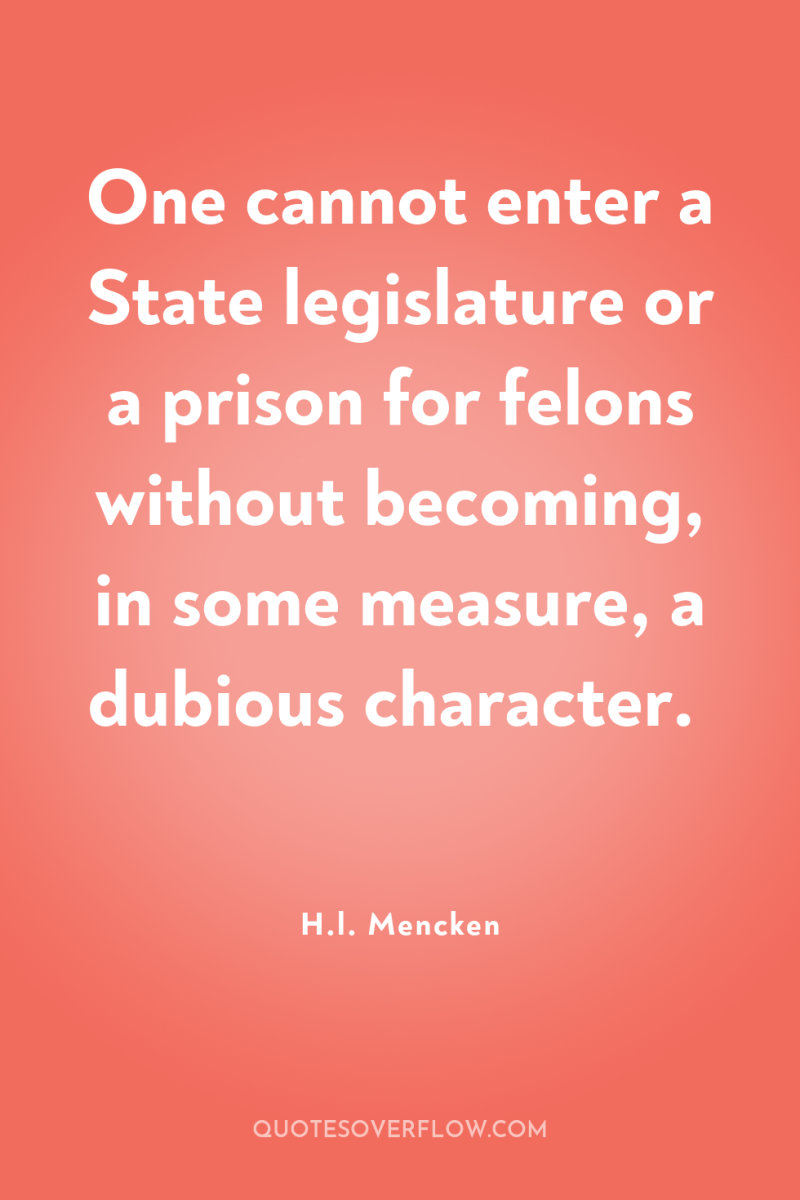
39
One cannot enter a State legislature or a prison for felons without becoming, in some measure, a dubious character.H.l. Mencken
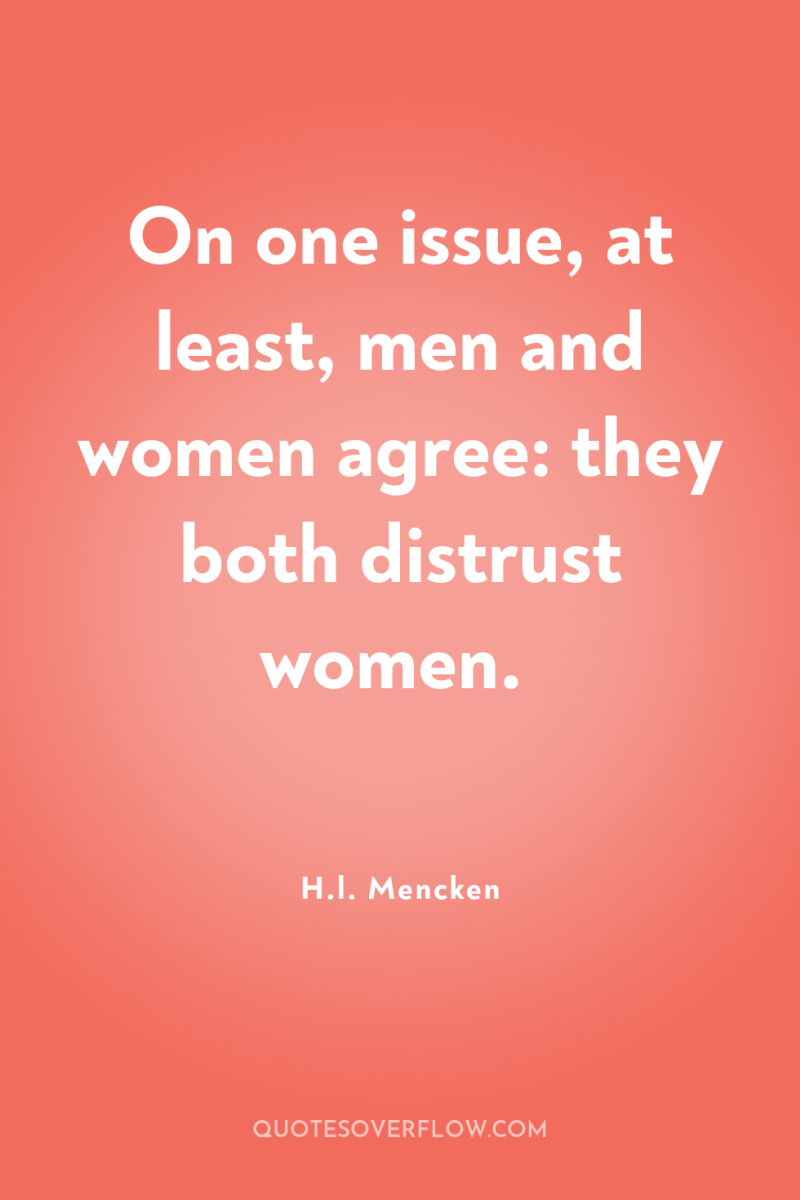
40
On one issue, at least, men and women agree: they both distrust women.H.l. Mencken

41
Giving every man a vote has no more made men wise and free than Christianity has made them good.H.l. Mencken
42
The great artists of the world are never Puritans, and seldom even ordinarily respectable.H.l. Mencken
43
Historian: an unsuccessful novelist.H.l. Mencken
44
Government today is growing too strong to be safe. There are no longer any citizens in the world there are only subjects. They work day in and day out for their masters they are bound to die for their masters at call. Out of this working and dying they tend to get less and less.H.l. Mencken
45
Marriage is a wonderful institution, but who would want to live in an institution?H.l. Mencken
46
When somebody says it’s not about the money, it’s about the money.H.l. Mencken
47
I believe that religion, generally speaking, has been a curse to mankind – that its modest and greatly overestimated services on the ethical side have been more than overcome by the damage it has done to clear and honest thinking. I believe that no discovery of fact, however trivial, can be wholly useless to the race, and that no trumpeting of falsehood, however virtuous in intent, can be anything but vicious. I believe that the evidence for immortality is no better than the evidence of witches, and deserves no more respect. I believe in the complete freedom of thought and speech – alike for the humblest man and the mightiest, and in the utmost freedom of conduct that is consistent with living in organized society. I believe in the capacity of man to conquer his world, and to find out what it is made of, and how it is run. I believe in the reality of progress. I –But the whole thing, after all, may be put very simply. I believe that it is better to tell the truth than to lie. I believe that it is better to be free than to be a slave. And I believe that it is better to know than be ignorant. .H.l. Mencken
48
What I'd like to read is a scientific review, by a scientific psychologist--if any exists--of 'A Scientific Man and the Bible'. By what route do otherwise sane men come to believe such palpable nonsense? How is it possible for a human brain to be divided into two insulated halves, one functioning normally, naturally and even brilliantly, and the other capable only of such ghastly balderdash which issues from the minds of Baptist evangelists? Such balderdash takes various forms, but it is at its worst when it is religious. Why should this be so? What is there in religion that completely flabbergasts the wits of those who believe in it? I see no logical necessity for that flabbergasting. Religion, after all, is nothing but an hypothesis framed to account for what is evidentially unaccounted for. In other fields such hypotheses are common, and yet they do no apparent damage to those who incline to them. But in the religious field they quickly rush the believer to the intellectual Bad Lands. He not only becomes anaesthetic to objective fact; he becomes a violent enemy of objective fact. It annoys and irritates him. He sweeps it away as something somehow evil..H.l. Mencken
49
After all, all he did was string together a lot of old, well-known quotations.H.l. Mencken
50
A man's women folk, whatever their outward show of respect for his merit and authority, always regard him secretly as an ass, and with something akin to pity. His most gaudy sayings and doings seldom deceive them; they see the actual man within, and know him for a shallow and pathetic fellow. In this fact, perhaps, lies one of the best proofs of feminine intelligence, or, as the common phrase makes it, feminine intuition. The marks of that so-called intuition are simply a sharp and accurate perception of reality, a habitual immunity to emotional enchantment, a relentless capacity for distinguishing clearly between the appearance and the substance. The appearance, in the normal family circle, is a hero, a magnifico, a demigod. The substance is a poor mountebank.H.l. Mencken
51
There is reinforcement in such familiar back-formations as Chinee from Chinese, Portugee from Portuguese.H.l. Mencken
52
Morality is doing what is right regardless of what you are told. Obedience is doing what is told regardless of what is right.H.l. Mencken
53
Yet the same thing happens to the notions of morality. They are devised, at the start, as measures of expediency, and then given divine sanction in order to lend them authority.H.l. Mencken
54
The most dangerous man to any government is the man who is able to think things out for himself, without regard to the prevailing superstitions and taboos. Almost inevitably he comes to the conclusion that the government he lives under is dishonest, insane, and intolerable...H.l. Mencken
55
The kind of man who wants the government to adopt and enforce his ideas is always the kind of man whose ideas are idiotic.H.l. Mencken
56
Every decent man is ashamed of the government he lives under.H.l. Mencken
57
The most dangerous man to any government is the man who is able to think things out for himself, without regard to the prevailing superstitions and taboos. Almost inevitably he comes to the conclusion that the government he lives under is dishonest, insane and intolerable, and so, if he is romantic, he tries to change it. And even if he is not romantic personally he is very apt to spread discontent among those who are.H.l. Mencken
58
I do not believe in democracy, but I am perfectly willing to admit that it provides the only really amusing form of government ever endured by mankind.H.l. Mencken
59
The demagogue is one who preaches doctrines he knows to be untrue to men he knows to be idiots.H.l. Mencken
60
When a candidate for public office faces the voters he does not face men of sense; he faces a mob of men whose chief distinguishing mark is the fact that they are quite incapable of weighing ideas, or even of comprehending any save the most elemental – men whose whole thinking is done in terms of emotion, and whose dominant emotion is dread of what they cannot understand. So confronted, the candidate must either bark with the pack or be lost.. All the odds are on the man who is, intrinsically, the most devious and mediocre – the man who can most adeptly disperse the notion that his mind is a virtual vacuum. The Presidency tends, year by year, to go to such men. As democracy is perfected, the office represents, more and more closely, the inner soul of the people. We move toward a lofty ideal. On some great and glorious day the plain folks of the land will reach their heart's desire at last, and the White House will be adorned by a downright moron. .H.l. Mencken
61
I believe that it is better to tell the truth than a lie. I believe it is better to be free than to be a slave. And I believe it is better to know than to be ignorant.H.l. Mencken
62
But the whole thing, after all, may be put very simply. I believe that it is better to tell the truth than to lie. I believe that it is better to be free than to be a slave. And I believe that it is better to know than be ignorant.H.l. Mencken
63
Race relations never improve in war time; they always worsen. And it is when the boys come home the Ku Klux Klans are organized. I believe with George Schuyler that the only really feasible way to improve the general situation of the American Negro is to convince more and more whites that he is, as men go in this world, a decent fellow, and that amicable living with him is not only possible but desirable. Every threat of mass political pressure, every appeal to political mountebanks, only alarms the white brother, and so postpones the day of reasonable justice. .H.l. Mencken
64
Nevertheless, it is even harder for the average ape to believe that he has descended from man.H.l. Mencken
65
In the superman Nietzsche gave the world a conceivable and possible goal for all human effort. But there still remained a problem and it was this: When the superman at last appears on earth, what then? Will there be another super-superman to follow and another super-super-superman after that? In the end, will man become the equal of the creator of the universe, whoever or whatever He may be? Or will a period of decline come after, with return down the long line, through the superman down to man again, and then on to the anthropoid ape, to the lower mammals, to the asexual cell, and, finally, to mere inert matter, gas, ether, and empty space? .H.l. Mencken
66
The urge to save humanity is almost always only a false-face for the urge to rule it. Power is what all messiahs really seek: not the chance to serve. This is true even of the pious brethren who carry the gospel to foreign parts.H.l. Mencken
67
The more uncivilized the man, the surer he is that he knows precisely what is right and what is wrong. All human progress, even in morals, has been the work of men who have doubted the current moral values, not of men who have whooped them up and tried to enforce them. The truly civilized man is always skeptical and tolerant, in this field as in all others. His culture is based on - I am not too sure. .H.l. Mencken
68
A home is not a mere transient shelter: its essence lies in the personalities of the people who live in it.H.l. Mencken
69
I believe that liberty is the only genuinely valuable thing that men have invented, at least in the field of government, in a thousand years. I believe that it is better to be free than to be not free, even when the former is dangerous and the latter safe. I believe that the finest qualities of man can flourish only in free air–that progress made under the shadow of the policeman’s club is false progress, and of no permanent value. I believe that any man who takes the liberty of another into his keeping is bound to become a tyrant, and that any man who yields up his liberty, in however slight the measure, is bound to become a slave. .In any dispute between a citizen and the government, it is my instinct to side with the citizen . I am against all efforts to make men virtuous by law. .H.l. Mencken
70
There are two kinds of Europeans: The smart ones, and those who stayed behind.H.l. Mencken
71
We are, in fact, a nation of evangelists; every third American devotes himself to improving and lifting up his fellow-citizens, usually by force; the messianic delusion is our national disease.H.l. Mencken
72
Indeed it may be said with some confidence that the average man never really thinks from end to end of his life. There are moments when his cogitations are relatively more respectable than usual, but even at their climaxes they never reach anything properly describable as the level of serious thought. The mental activity of such people is only a mouthing of clichés. What they mistake for thought is simply a repetition of what they have heard. My guess is that well over eighty per cent. of the human race goes through life without having a single original thought. That is to say, they never think anything that has not been thought before and by thousands. .H.l. Mencken
73
In brief, the teaching process, as commonly observed, has nothing to do with the investigation and establishment of facts, assuming that actual facts may ever be determined. Its sole purpose is to cram the pupils, as rapidly and as painlessly as possible, with the largest conceivable outfit of current axioms, in all departments of human thought–to make the pupil a good citizen, which is to say, a citizen differing as little as possible, in positive knowledge and habits of mind, from all other citizens. In other words, it is the mission of the pedagogue, not to make his pupils think, but to make them think right, and the more nearly his own mind pulsates with the great ebbs and flows of popular delusion and emotion, the more admirably he performs his function. He may be an ass, but this is surely no demerit in a man paid to make asses of his customers. .H.l. Mencken
74
Democracy is the theory that the common people know what they want and deserve to get it good and hard.H.l. Mencken
75
No one in this world, so far as I know–and I have searched the record for years, and employed agents to help me–has ever lost money by underestimating the intelligence of the great masses of the plain people.H.l. Mencken
76
Under democracy one party always devotes its chief energies to trying to prove that the other party is unfit to rule–and both commonly succeed, and are right.H.l. Mencken
77
Nietzsche, an infinitely harder and more courageous intellect, was incapable of any such confusion of ideas; he seldom allowed sentimentality to turn him from the glaring fact.H.l. Mencken
78
Conscience is the inner voice that warns us somebody may be looking.H.l. Mencken
79
Equality before the law is probably forever unattainable. It is a noble ideal, but it can never be realized, for what men value in this world is not rights but privileges.H.l. Mencken
80
School days, I believe, are the unhappiest in the whole span of human existence. They are full of dull, unintelligible tasks, new and unpleasant ordinances, brutal violations of common sense and common decency. It doesn't take a reasonably bright boy long to discover that most of what is rammed into him is nonsense, and that no one really cares very much whether he learns it or not.H.l. Mencken
81
He sees daily evidence that many things held to be true by nine-tenths of all men are, in reality, false, and he is thereby apt to acquire a doubt of everything, including his own beliefs.H.l. Mencken
82
The Jews could be put down very plausible as the most unpleasant race ever heard of. As commonly encountered they lack any of the qualities that mark the civilized man: courage, dignity, incorruptibility, ease, confidence. They have vanity without pride, voluptuousness without taste, and learning without wisdom. Their fortitude such as it is, is wasted upon puerile objects, and their charity is mainly a form of display. .H.l. Mencken
83
Morality and honor are not to be confused. "The difference between a moral man and a man of honor is that the latter regrets a discreditable act, even when it has worked and he has not been caught.H.l. Mencken
84
I have often misunderstood men grossly, and I have misrepresented them when I understood them, sacrificing sense to make a phrase. Here, of course, is where even the most conscientious critic often goes aground; he is apt to be an artist before he is a scientist, and the impulse to create something passionately is stronger in him than the impulse to state something accurately.H.l. Mencken
85
The best client is a scared millionaire.H.l. Mencken
86
American journalism (like the journalism of any other country) is predominantly paltry and worthless. Its pretensions are enormous, but its achievements are insignificant.H.l. Mencken
87
The notion that a radical is one who hates his country is naïve and usually idiotic. He is, more likely, one who likes his country more than the rest of us, and is thus more disturbed than the rest of us when he sees it debauched. He is not a bad citizen turning to crime; he is a good citizen driven to despair.H.l. Mencken
88
A poet more than thirty years old is simply an overgrown child.H.l. Mencken
89
Immortality is the condition of a dead man who doesn’t believe he is dead.H.l. Mencken
90
New York: A third-rate Babylon.H.l. Mencken
91
Every great wave of popular passion that rolls up on the prairies is dashed to spray when it strikes the hard rocks of Manhattan.H.l. Mencken
92
Self-respect--the secure feeling that no one, as yet, is suspicious.H.l. Mencken
93
Moral certainty is always a sign of cultural inferiority. The more uncivilized the man, the surer he is that he knows precisely what is right and what is wrong. All human progress, even in morals, has been the work of men who have doubted the current moral values, not of men who have whooped them up and tried to enforce them. The truly civilized man is always skeptical and tolerant, in this field as in all others. His culture is based on "I am not too sure.H.l. Mencken